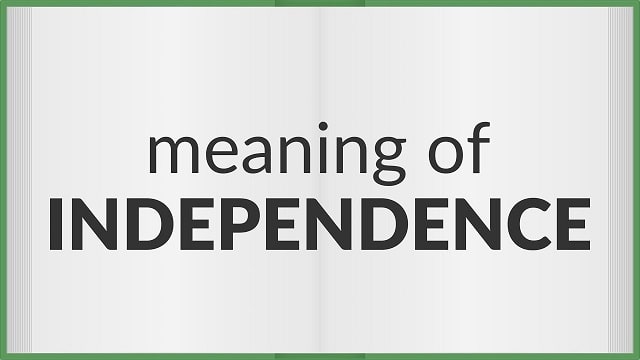Independence Meaning
The term independence is normally associated with the sovereign and autonomous quality of a country or a geographical region. However, its meaning is not exclusively political, and in many cases it can also be understood as a quality applicable to a person, an institution, or even an animal. We can say, then, that independence is a moral and ethical value that has to do with the capacity that the subject in question demonstrates to take care of itself and not be subjected to the guardianship or domination of a higher entity.
Independence is, in other words, non-dependence. Understood in this way, the term means the possibility of making decisions autonomously and freely. Needless to say, the notion of independence is deeply linked to that of freedom, which is why it becomes one of the most important and essential elements for human life.
Normally, the term independence is related to political phenomena, since it is also understood as the possibility that a country, a region, or a community has to govern itself and thus leave aside any dominion or guardianship that may come from another region or political entity. The struggles for independence have marked human history since the most ancient times precisely because, as there is the notion of independence, there is also the notion of dominion and submission. It is estimated that throughout human history there have been numerous cycles of independence that allowed numerous regions to free themselves from the yoke that fell upon them.
At the same time, the notion of independence can be applied to the everyday life of an ordinary person. In this sense, an independent person is someone who can take care of themselves, whether it be in terms of economic, social, work or housing matters.
Independence Meaning in Hindi
स्वतंत्रता शब्द आम तौर पर किसी देश या भौगोलिक क्षेत्र की संप्रभु और स्वायत्त गुणवत्ता से जुड़ा होता है। हालाँकि, इसका अर्थ केवल राजनीतिक नहीं है, और कई मामलों में इसे किसी व्यक्ति, संस्था या यहाँ तक कि किसी जानवर पर लागू होने वाले गुण के रूप में भी समझा जा सकता है। हम कह सकते हैं कि स्वतंत्रता एक नैतिक और नैतिक मूल्य है जिसका संबंध उस क्षमता से है जो संबंधित विषय खुद की देखभाल करने और किसी उच्च इकाई के संरक्षण या वर्चस्व के अधीन न होने के लिए प्रदर्शित करता है।
दूसरे शब्दों में, स्वतंत्रता गैर-निर्भरता है। इस तरह से समझा जाए तो इस शब्द का अर्थ स्वायत्त और स्वतंत्र रूप से निर्णय लेने की संभावना है। कहने की ज़रूरत नहीं है कि स्वतंत्रता की धारणा स्वतंत्रता से गहराई से जुड़ी हुई है, यही वजह है कि यह मानव जीवन के लिए सबसे महत्वपूर्ण और आवश्यक तत्वों में से एक बन जाती है।
आम तौर पर, स्वतंत्रता शब्द राजनीतिक घटनाओं से संबंधित है, क्योंकि इसे इस संभावना के रूप में भी समझा जाता है कि किसी देश, क्षेत्र या समुदाय को खुद पर शासन करना होगा और इस तरह किसी अन्य क्षेत्र या राजनीतिक इकाई से आने वाले किसी भी प्रभुत्व या संरक्षकता को छोड़ देना होगा। स्वतंत्रता के लिए संघर्ष ने मानव इतिहास को सबसे प्राचीन काल से चिह्नित किया है, क्योंकि स्वतंत्रता की धारणा के साथ-साथ प्रभुत्व और अधीनता की धारणा भी है। यह अनुमान लगाया जाता है कि पूरे मानव इतिहास में स्वतंत्रता के कई चक्र रहे हैं, जिसने कई क्षेत्रों को उन पर पड़ने वाले जुए से खुद को मुक्त करने की अनुमति दी।
साथ ही, स्वतंत्रता की धारणा को एक साधारण व्यक्ति के रोजमर्रा के जीवन पर लागू किया जा सकता है। इस अर्थ में, एक स्वतंत्र व्यक्ति वह है जो खुद की देखभाल कर सकता है, चाहे वह आर्थिक, सामाजिक, कार्य या आवास के मामले में हो।
